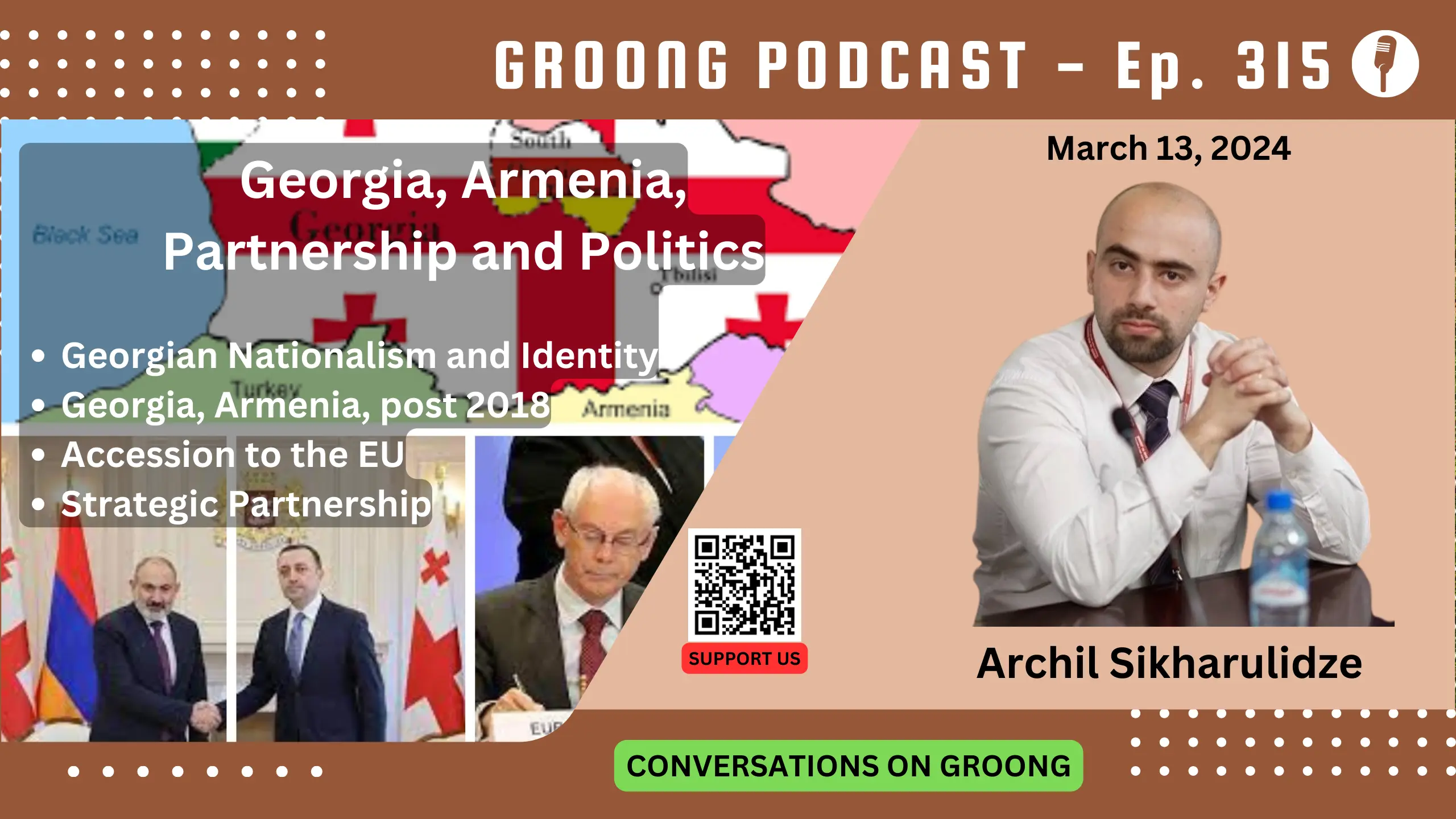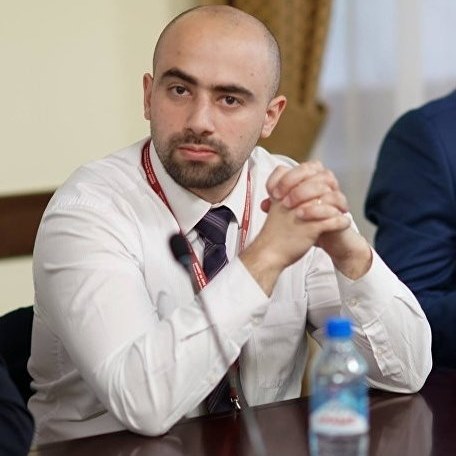
Groong Links:
Guest:
Topics:
- Georgian Nationalism and Identity
- Georgia, Armenia, post 2018
- Accession to the EU
- Strategic Partnership
Episode 315 | Recorded: March 12, 2024
Show Notes
Georgia, Armenia, Partnership & Politics in the South Caucasus
Archil, since it’s the first time you’re on the show, we’d appreciate learning a little more about your background. Can you tell us your areas of interest?
Georgian Nationalism & Identity
Archil, when initially we were planning this interview, we asked you for a profile picture and you said to not expect one in a suit. And that sparked a number of interesting tangential discussions about conservatism and nationalism in Georgia.
Many Armenians know Georgians as some of the most conservative and nationalistic among the ex-Soviet countries. This national identity is the driving force that makes Georgians see themselves as distinct from Russia, and associate instead with opponents of Russian centers of influence.
Question:
- Perhaps we’re being too simplistic, but can you help paint a picture of Georgian nationalism and how it helped form Georgian identity and current political sentiments that help define the country’s policies?
Modern relations between Georgia and Armenia are by and large cordial but generally not particularly warm.
Question:
- For two nations that are so highly intertwined and for so long in history, why aren’t Armenians and Georgians better friends and allies?
Georgian and Armenian Relations Post 2018
I want to ask you about an article you wrote, published by RIAC about the Georgian reaction to the 2018 regime change in Armenia.
You highlighted the surprise within the Georgian political establishment at the events unfolding in Armenia but also their lack of proactive engagement with the situation. While some elements of the Georgian opposition expressed solidarity with the Armenian movement, overall there was a disconnect between Georgian elites and the developments in Armenia.
To be honest, looking at the issue from the other side, one can say that many Armenians also show little interest in the events that occurred in Georgia, for example in 2003 and since. So the sentiment may be mutual, but it is rather puzzling.
Questions:
- How were the 2018 events in Armenia perceived in Georgia? And also how did you personally view them?
- Do you believe that Georgia’s strategic relationships with Azerbaijan and Turkey contributed to this sort of curtain dividing Armenia and Georgia?
EU Accession
On 14 December 2023, the EU accepted Georgia’s application for candidate status. Yet, one can imagine that Georgia’s journey to EU accession is just beginning.
Question:
- How complex is the process? What are the major requirements set by the EU? And how long will it take?
Georgia’s (and Ukraine’s) membership candidacy comes in the midst of a brutal war that is now 2 years old with no end in sight. In this context, there is immense pressure from the major warring sides to pull countries in their direction. So far, Georgia has managed to successfully navigate these turbulent diplomatic waters.
Questions:
- From our previous podcast, our guest said that he doesn’t believe Georgia was so successful. So I guess we should ask… Do you concur?
- What do you think has contributed to this diplomatic success?
- Unlike Georgia, Armenia’s government has not managed to walk the fine line between the warring sides. Why is that?
This past week officials have talked more openly about Armenia seeking EU membership. Russia has responded rather bluntly.
Question:
- What is Russia’s response and policy towards Georgia’s EU membership?
Georgia’s military is already very much integrated with NATO. And I’m sure many Georgian political forces would support deepening that by official membership. We know that Russia gets extremely irritated when a NATO official praises Armenia for some policy or some other collaboration. We also know Russia’s insistence on having a neutral Ukraine on its borders and this could be cited as one of the main reasons for the war in Ukraine.
Question:
- What are the Russian red lines vis-a-vis Georgia’s potential for joining NATO?
Armenia - Georgia Strategic Partnership
On January 26, Pashinyan was in Tbilisi, and met with Georgian Prime Minister Irakli Gharibashvili. A strategic partnership agreement was signed between the two countries that encompasses nearly a dozen spheres, excluding defense. But even after a month, little is known about the contents of the agreement.
Pretty much all Armenians place a high value on improving relations with Georgia but many of us want to know what real benefits this deal will provide. Additionally, different analysts have differing interpretations of this development: some claim that this is a step in the direction of pulling Armenia more towards the west; while others say that this move will benefit the Iran-Armenia-Georgia geopolitical axis and economic North-South corridor, strengthening relations with Iran.
Questions:
- Why isn’t there more information about the content of this strategic partnership?
- How is this partnership seen by Russia and Iran?
Military Cooperation
During the 44 day war, Georgia actually blocked military supplies from Russia to Armenia. Even during the latest shipment of French “Bastion” APCs (armored personnel carriers), there was news that the shipment was held up in Georgia until Paris twisted Tbilisi’s arms. Meanwhile on a weekly basis we see military supplies from countries like Israel and Turkey pass unfettered through Georgian airspace and territory, on their way to Azerbaijan.
Questions:
- Why was defense cooperation left out of the signed strategic partnership?
- Georgia has defense cooperation agreements with Azerbaijan. Will those agreements continue to trump Armenian-Georgian cooperation?
- Can this upgrade in relations help Armenia achieve a more balanced stance by Georgia as a military and non-military crossroads for itself and Azerbaijan?
Wrap-up
That’s our show, we hope you found it useful. Please find us on Social Media and follow us everywhere you get your Armenian news, the links are in the show notes. Thanks to Laura Osborn for the music on our podcasts. We’ll talk to you soon!
Guests

Archil Sikharulidze
Dr. Archil Sikharulidze is a founder of the Tbilisi-based research institute SIKHA foundation, in the Republic of Georgia. He holds masters degrees in International Relations from Tbilisi State University, and Public Administration from The Robert Gordon University in Scotland. Mr. Sikharulidze is focused on Russian and Islamic Studies. Additionally, political processes and international relations in Ukraine, the South Caucasus and Kazakhstan. He writes extensively for various local and international platforms such as OpenDemocracy, NewEasternEurope, CommonSpace.EU, RIAC, and Russia in Global Politics.
Hosts

Hovik Manucharyan
Hovik Manucharyan is an information security engineer who moved from Seattle to Armenia in 2022. He co-founded the ANN/Groong podcast in 2020 and has been a contributor to Groong News since the late 1990s.
Disclaimer: The views expressed by Hovik Manucharyan on the ANN/Groong podcast are his own and do not necessarily reflect the opinions of his employer or any other organization.

Asbed Bedrossian
Asbed is founder of the Armenian News Network Groong and co-founder of the ANN/Groong podcast.